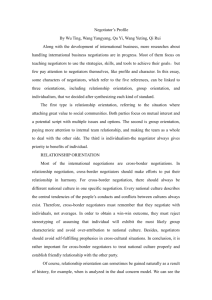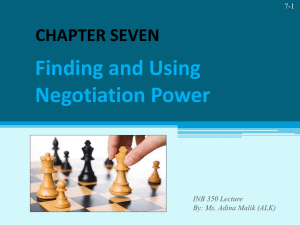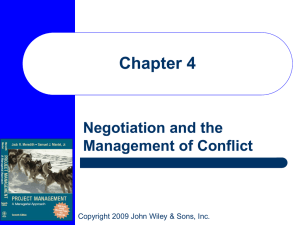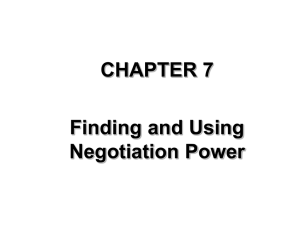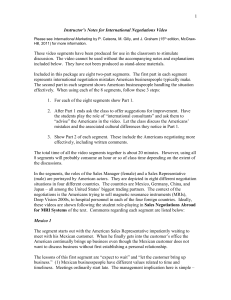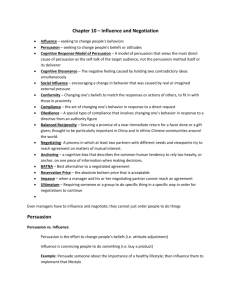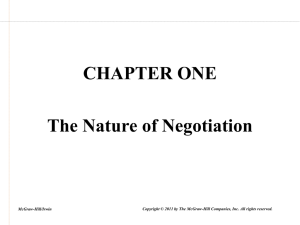Negotiation Myths (PowerPoint)
advertisement
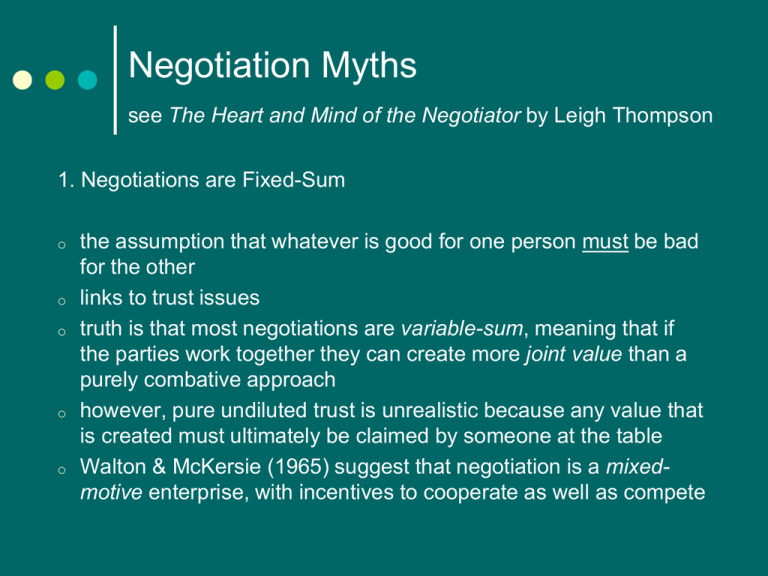
Negotiation Myths see The Heart and Mind of the Negotiator by Leigh Thompson 1. Negotiations are Fixed-Sum o o o o o the assumption that whatever is good for one person must be bad for the other links to trust issues truth is that most negotiations are variable-sum, meaning that if the parties work together they can create more joint value than a purely combative approach however, pure undiluted trust is unrealistic because any value that is created must ultimately be claimed by someone at the table Walton & McKersie (1965) suggest that negotiation is a mixedmotive enterprise, with incentives to cooperate as well as compete 2. You Need to Be Either Tough or Soft o o o traditional views of negotiation, and negotiators, are that you need to be either tough or ‘reasonable’ to the point of being soft and concessionary Bazerman & Neale (1992) suggest that effective negotiators are neither along with Fisher & Ury (1981) they suggest that effective negotiators correctly recognise that to achieve their own outcomes they must work together to generate value – cooperate, collaborate – but should also leverage their own power and strength 3. Good Negotiators Are Born o o o o o there is a belief that these skills are in some way ‘natural’ and this can’t easily be learned Thompson suggests this is not true, and may be due to the selective nature of the reporting of negotiation events e.g. one-off events she suggests that the most important negotiations are those that we engage in every day with colleagues, supervisors and business associates and that these are a better index of performance to develop your skills you need practice and feedback experience is helpful but not sufficient 4. Experience is Enough o o o o o o experience, without feedback, is largely ineffective at improving negotiation skills* without feedback then it is difficult to improve memories and perception are selective – we focus on our successes and forget/ignore our failures psychologists call it the locus of control – who is responsible? experience leads to confidence and this can be beneficial but accuracy and focus must also be maintained. confidence may lead to increased risk-taking, misguided assumptions, cutting corners on preparation, underestimating your opponents, reduced motivation, miss-reading signals and so on. * Loewenstein, Thompson & Gentner 2003, Nadler, Thompson & Van Boven 2003 5. Good Negotiators Take Risks o o o the idea that effective negotiation involves risks and gambles using statements like “this is my final offer” and using a tough style, involving bluffs and threats this may seem impressive (when recalling the story) and suggest an ‘experienced’ approach but Thompson suggests it is often ineffective and that risk and uncertainty must be handled carefully, not superficially 6. Reliance on Intuition o o o a pervasive idea in negotiation – and indeed in decision making in general – is that ‘gut feeling’ and ‘intuition’ are valid drivers of behaviour however, good decisions are usually made after sound preparation, clear planning, deliberate thought, rational analysis and an evidence-based approach proactive approaches and strategies tend to be more effective than reactive ones, where you are dependent on others

